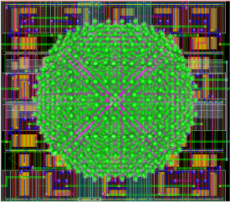DFT Beyond Moore’s Law: Extreme Hardware Specialization for the Future of HPC
LS3DF LDRD
The project goal is to demonstrate the performance potential of purpose-built architectures as potential future for HPC applications in absence of Moore’s Law. Our approach is to reformulate the LS3DF algorithm to make it amenable to specialized hardware and to develop a custom accelerator for Density Functional Theory. The initial design/prototype will target an FPGA, and results will also be projected to an ASIC. Later, we intend to generalize our results to to broader implications for DOE HPC workload. The impact of this project is to determine the feasibility of this approach for future DOE HPC. It can help NERSC to establish a new public-private business model with HPC vendors, and can potentially change how NERSC operates in “Post Moore” era.
Project Participants
- John Shalf (PI)
- Zhengji Zhao (NERSC)
- Lin-Wang Wang (MSD)
- Andrew Canning (CRD)
About Berkeley Lab
Founded in 1931 on the belief that the biggest scientific challenges are best addressed by teams, Lawrence Berkeley National Laboratory and its scientists have been recognized with 16 Nobel Prizes. Today, Berkeley Lab researchers develop sustainable energy and environmental solutions, create useful new materials, advance the frontiers of computing, and probe the mysteries of life, matter, and the universe. Scientists from around the world rely on the Lab’s facilities for their own discovery science. Berkeley Lab is a multiprogram national laboratory, managed by the University of California for the U.S. Department of Energy’s Office of Science.
DOE’s Office of Science is the single largest supporter of basic research in the physical sciences in the United States, and is working to address some of the most pressing challenges of our time. For more information, please visit energy.gov/science.










